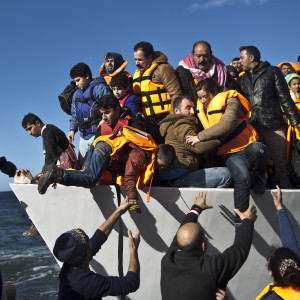Sitting in a small Syrian restaurant on the Greek Island of Lesvos, Al told us about his journey to helping his fellow refugees. He sat at the far end of a long table, piled high with a cornucopia of Middle Eastern foods, describing his experiences to 20 Atlantic Council Millennium Fellows on a study tour of refugee issues. He detailed the journey of perils, trading away the uncertainty of the war zone for the certainty of the difficult, frequently inhumane conditions in temporary camps.
Circumstances forced him to identify and choose the least worst of bad options.
Millions have traveled similar routes; after all, the number of displaced in 2018 will be the most ever since the second World War. In Syria, hundreds of thousands of women, children and elderly are fleeing Daraa, where the civil war began more than seven years ago, as Bashar al-Assad’s forces close in on the heavily populated area.
Yet, their struggles to escape the violence and rebuild their lives barely pierces the public consciousness, save for a fleeting outpouring of empathy in 2015. If the Syrian regime, along with their Russian allies, undertakes a large-scale operation in that city, the resulting humanitarian crisis could rival previous major crises such as the ISIS sweep across northern Iraq and the regime’s attack on Aleppo.
Such an attack on Daraa would add a catalyst to a humanitarian emergency that has burned out-of-control for years. Many refugees who previously made the journey are now frozen in place in Turkey and Greece, a terrible temporary situation that is, by the day, rapidly becoming permanent.
And it isn’t just Syrians and Iraqis — Africans fleeing violence and seeking economic opportunity; Iranians and Afghans; and many others who have left their home countries are stuck, unable to return home and unable easily to pursue permanent accommodations. Greek officials we met with spoke of the “new normal” of migration, a systemic environmental change with which Europe has not fully grappled.
At the moment, America isn’t even leading from behind on refugees; we are actively running away from them. While most Americans can trace their family’s immigrant roots by going back a mere one or two generations, America is on track to accept the fewest number of refugees ever since the passage of the Refugee Act nearly 40 years ago. The rhetoric from many top American political leaders makes it clear that not only will they refuse to welcome refugees like “Al,” but they also have forgotten the words inscribed at the base of the Statue of Liberty. This abject moral abdication is both tragic and could also cause long-term damage to our collective security.
During our visit to Greece, we traveled to the School of Peace, a non-profit institution run jointly by Palestinian and Israeli civilians for the purposes of educating young refugee children. Our tight-knit group of fellows are from various countries, and one of the teachers asked the children to yell out where they ultimately wanted to end up. Several of the children said “United States” and “America.” I could not help but feel pangs of despair recognizing the improbability that these children would end up in America, let alone somewhere else in Europe.
As a naturalized American who immigrated to America at the age of 4 and as a veteran of the Iraq War, my connections to these children are both personal and geopolitical. By chance, I was not born in a country ravaged by war and was therefore able to come to America under normal circumstances. However, it seems that we are misattributing the character of these young children and refugees to the conditions that they came from — a common but tragic cognitive bias.
Instead, we must learn to recognize refugees’ enormous potential to be a force for good in the world. For instance, immigrant-owned businesses now generate an estimated $775 billion in revenue annually in the United States, a major economic force that provides hundreds of thousands of jobs for average Americans.
And how easily do we forget our own role in this new normal: While systematic factors such as climate change certainly played a role, our intervention in Iraq in 2003 and subsequent failure to secure the peace has led, in large part, to the flows of people that affect Turkey, Greece and the rest of Europe. We are responsible for much; yet we, as a country, and our government does little.
We can do more. We must do more. Many local charities in Greece such as Lesvos Solidarity are doing the difficult and thankless work every day to help the displaced. Larger aid organizations such as United Nations High Commissioner for Refugees and Save the Children continue to work tirelessly on behalf of refugees. At home, the International Refugee Assistance Project legally represents asylum seekers, and No One Left Behind helps former Iraqi and Afghan interpreters, some of whom are themselves refugees, resettle.
To not help those in need is deeply counter to our American values. The world will not forget when we did not live our values. Let us take personal action and let us demand that our government live up to the core American values we hold dear.

